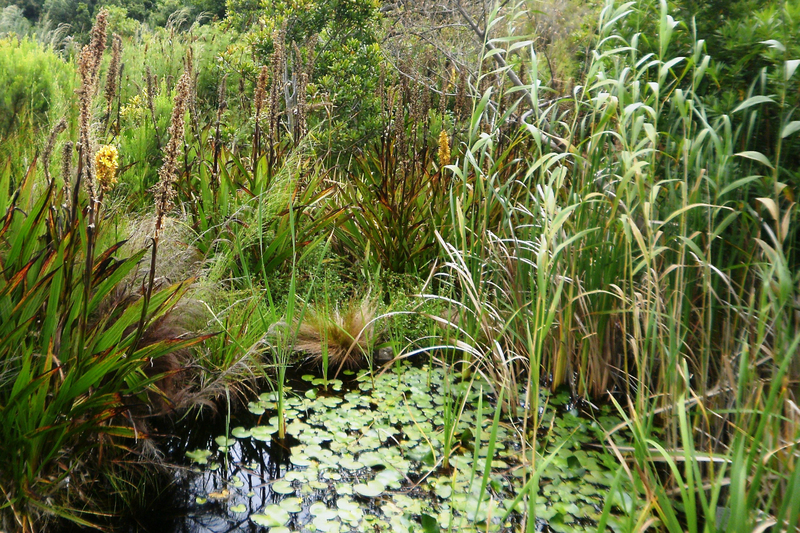Merging economic behaviour and nature-based solutions
31 August 2022 | Story NADIA KRIGE. Photo Abu Shawka, Wikimedia Commons. Read time 6 min.
Transdisciplinary research at the University of Cape Town (UCT) is set to get a boost with Professor Martine Visser’s recent appointment as the South African Research Chairs Initiative’s (SARChI) Chair in Governance and Economics for Ecological Infrastructure.
The chair is designed to support and expand the South African scientific research base focusing on the development of policies related to ecological infrastructure and nature-based solutions. It is co-funded by the Department of Science and Innovation, the National Research Foundation, the Department of Environmental Affairs and the Water Research Commission’s Water Research, Development and Innovation Roadmap.
Visser, who is director of the Environmental Policy Research Unit (EPRU) within UCT’s School of Economics, says the collaborative nature of the research chair is an excellent opportunity to have a diverse array of stakeholders, academics, policymakers and those working on the ground, put their heads together for exciting new projects.
“[It] presents a unique opportunity to bring economic behaviour and nature-based solutions into the same room with a combined long-term goal of resilient ecosystems and livelihoods,” she explains.
Building on a firm foundation
In her role as chair, Visser will be building on the foundation of previous research projects that have straddled the lines between ecology, behavioural economics and policy development.
It was her love of nature and the environment that inspired Visser to pursue an undergraduate degree in geology some 20 years ago. During this time, she started nurturing curiosity about sustainable development and the link between the environment and people’s livelihoods.
With the help of her mentor, Professor Anthony Leiman, Visser was given the opportunity to pursue a master’s degree at the UCT School of Economics and started researching the impact of pollution and industrial development on communities across South Africa.
“It is possible for people to drastically reduce their consumption when there is an imminent threat.”
From there, she enrolled in a PhD focusing on climate change and development at the University of Gothenburg in Sweden and, ultimately, discovered her niche in behavioural economics which was gaining ground as a new field of research at the time.
“I got really drawn into the link between environment and behaviour,” Visser says. “It fascinated me that we could look at how decision-making, social norms, cooperation, trust and reciprocity impact people’s behaviours in the face of social dilemmas – of which climate change is probably the biggest.”
Subsequently, Visser’s expertise in behavioural economics has been harnessed to assist in an array of real-life social dilemmas.
She and her EPRU colleagues were integrally involved in researching Cape Town’s recent water crisis. One of their projects, conducted during the early stages of the Cape Town drought, involved seeing how behavioural nudges could be used to inspire Capetonians across all neighbourhoods and income levels to use water more sparingly.
“One of the typical nudges we used was to place an insert in people’s municipal utilities bill, comparing their water usage to the average in their neighbourhood,” Visser explains. “When people become aware that there is a social norm around something, they tend to change their behaviour in order to comply.”
Other nudges included giving social recognition to those going the extra mile to save water by putting their names on the city’s website and making people aware of what they could save if they used water more sparingly – or what they could lose if they didn’t.
As for Capetonians’ overall behaviour in response to the battery of policy instruments rolled out during the water crisis, Visser observes: “Over the course of two years, everyone brought their consumption down by about 50%, indicating that it is possible for people to drastically reduce their consumption when there is an imminent threat.”
“When people become aware that there is a social norm around something, they tend to change their behaviour in order to comply.”
She adds that, among other things, they aim to apply the insights from this body of work to a broader context of nature-based solutions related to climate change and water management in the next phase of their research.
International significance
Although much of Visser and her colleagues’ work focuses on South African dilemmas, EPRU forms part of the Environment for Development initiative (EfD), an international network of environmental economics research centres whose work focuses on solving pressing environmental and development challenges.
The network consists of over 200 centres based in the Global South, hosted by leading local academic research institutions in 13 countries, including Chile, China, Ethiopia, Ghana, India, Kenya, Nigeria, South Africa and Vietnam.
EPRU also hosts the Natural Capital Collaboration, an EfD project that aims to improve the empirical knowledge of valuing ecosystem services and biodiversity, water systems and sustainable agriculture to better account for these services throughout the Global South. One of the goals is to promote collaborative, interlinked research both within and outside of the EfD network to stimulate policy action.
Capacity building
Apart from seeing the opportunity to expand research collaboration within the Natural Capital Collaboration, Visser is particularly excited about the ability of the SARChI Chair in Governance and Economics for Ecological Infrastructure to build capacity at UCT and present young researchers with career-enhancing opportunities.
“My model of work has always been to work very closely with students, and we often manage to get our work into good, specialised international journals,” she says. “So, this is a fantastic opportunity to get more students involved and make sure that they have sufficient funding to take them through their entire degree.”
 This work is licensed under a Creative Commons Attribution-NoDerivatives 4.0 International License.
This work is licensed under a Creative Commons Attribution-NoDerivatives 4.0 International License.
Please view the republishing articles page for more information.









